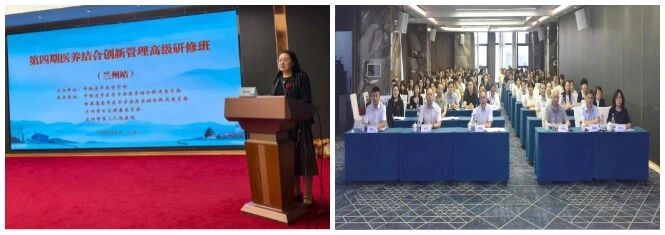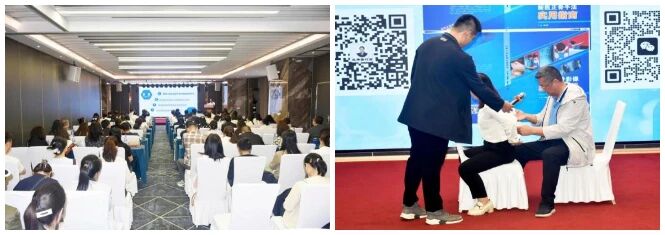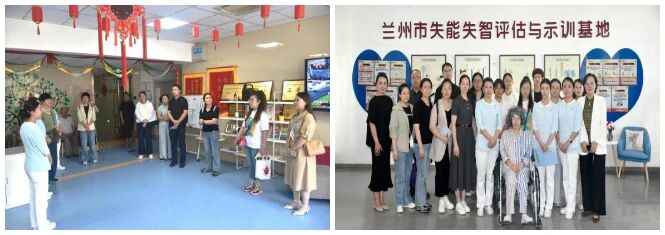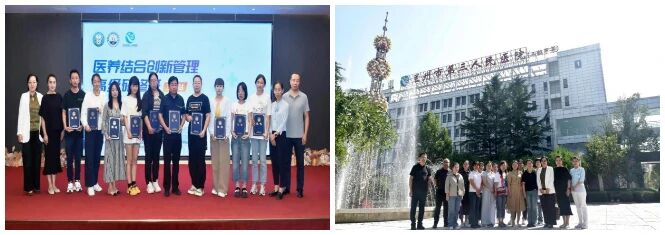The fourth advanced training course on innovative management of medical and elderly care integration was successfully held
From September 13th to 14th, 2025, the event is hosted by the Chinese Geriatrics Society and organized by the Medical and Elderly Care Integration Promotion Committee of the Chinese Geriatrics Society, the Medical and Elderly Care Integration Promotion Committee of the Gansu Geriatrics Society, the Health Commission of Lanzhou City, and the Third People's Hospital of Lanzhou City. The "Fourth Advanced Training Course on Innovative Management of Medical and Elderly Care Integration" co-organized by the Third People's Hospital of Gansu Province was successfully held and concluded in Lanzhou, Gansu Province.
Yu Pulin, executive director and vice president of the Chinese Geriatrics Society and honorary director of the Geriatrics Branch of the Chinese Medical Association; Professor Yang Tingshu, President of the Medical and Elderly Care Integration Promotion Committee of the Chinese Geriatrics Society, former director of the Academic Committee of the Cardiovascular Department of the General Hospital of the People's Liberation Army and chief physician; Lu Liping, President of the Medical and Elderly Care Integration Promotion Committee of the Gansu Geriatrics Society Zhang Yibing, Director of the Aging Department of the Health Commission of Gansu Province, Wu Wenshan, Deputy Director of the Health Commission of Lanzhou City, and Huo Xiaoning, President of the Third People's Hospital of Lanzhou City, and other leaders attended the opening ceremony and delivered speeches successively.
Explore innovative paths for integrating medical care and elderly care to facilitate the development of healthy aging

This training course has specially invited authoritative experts from multiple fields such as national policy research, standard setting, medical institutions, and colleges and universities, as well as practitioners in the field of medical and elderly care integration. With the core theme of "Exploring Innovative Paths for Medical and Elderly Care Integration to Promote the Development of Healthy Aging", Focus on key issues such as the policy trends of integrating medical care and elderly care, standardization construction, service quality management, management of comorbidities among the elderly, and the long-term care insurance system, and carry out extensive and in-depth exchanges and discussions. The event aims to promote the steady progress of medical and elderly care integration services towards standardization, professionalization and high quality by relying on academic discussions and sharing of practical experience.

During the two-day training process, a total of 15 high-quality academic reports were carefully arranged. The content was rich and diverse, presenting a professional feast covering multiple dimensions and combining theoretical depth with practical value to the participants.
On-site observation to gain true wisdom and practical exchange to promote improvement

This training course also specially set up an institutional practice visit session. The participants went to the Third People's Hospital of Lanzhou City (Lanzhou Elderly Care Home) for on-site observation. Over the years, this hospital has accumulated rich practical experience in areas such as elderly mental health services, psychological care services, and care for the disabled and demented elderly, and has formed a unique integrated service model of "medical care, rehabilitation, maintenance and care". The representatives of the trainees visited and inspected the geriatric mental health department, traditional Chinese medicine department, rehabilitation medicine department and geriatric nursing home of the hospital in depth. They highly recognized the innovation of the hospital's medical and elderly care integration development model and the practicality of its practical experience. They also had in-depth on-site exchanges on practical issues such as "optimizing service processes and improving care quality".
Unite consensus, embark on a new journey, and jointly draw the blueprint for the development of medical care and elderly care

Promoting the integration of medical care and elderly care is an urgent requirement of the national strategy for actively responding to population aging, and it is also an important task for ensuring and improving people's livelihood. It not only concerns the well-being of hundreds of millions of people, but also social harmony and stability. Against this backdrop, this training course not only provided a platform for in-depth communication and cooperation for practitioners in the medical and elderly care integration industry, but also contributed new ideas for exploring a development path of medical and elderly care integration that suits China's national conditions.
Relying on the policy interpretation and practical experience sharing of authoritative experts, the trainees have formed a more systematic understanding and a deeper comprehension of the standardization construction of medical and elderly care integration and service quality management, and have further clarified the future development direction of the industry. Meanwhile, the on-site observation by Lanzhou Third People's Hospital provided the participants with replicable and referential vivid practical samples, further strengthening the industry's confidence in promoting the development of medical and elderly care integration and gathering the driving force for progress.
In the future, with the continuous improvement of policies related to the integration of medical care and elderly care and the iterative upgrading of technical means, the field of integrated medical care and elderly care services in China is bound to embrace broader development prospects, injecting stronger impetus into actively responding to population aging and enhancing the health and well-being of the elderly.

